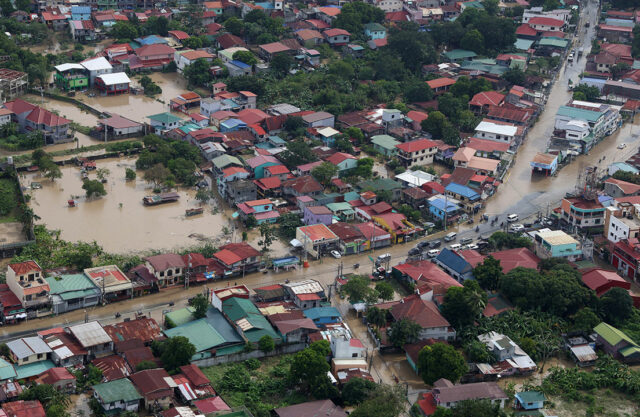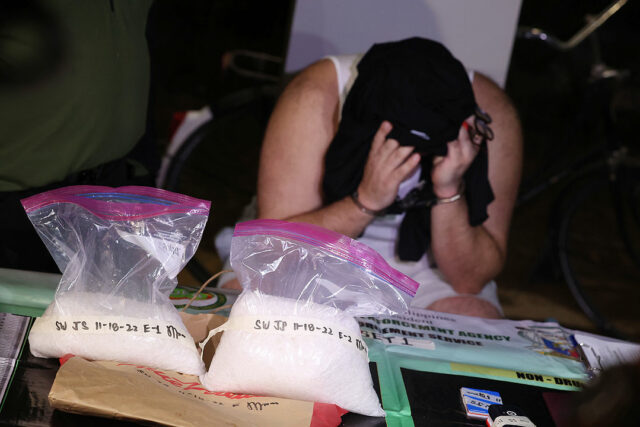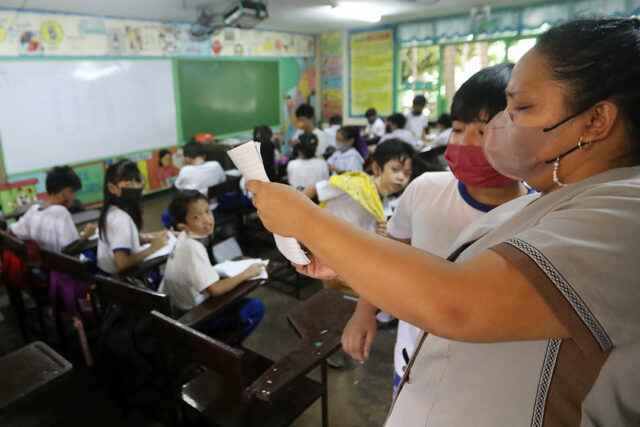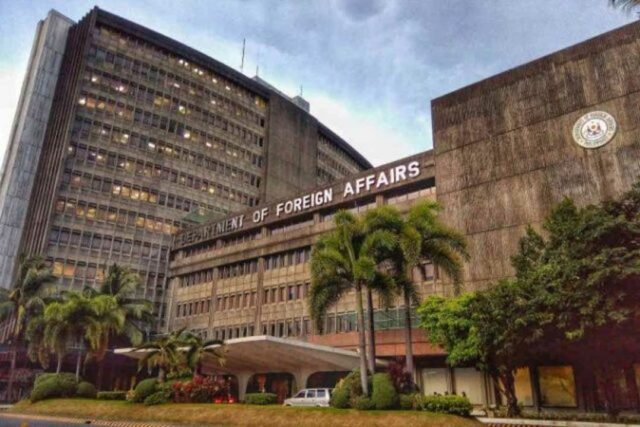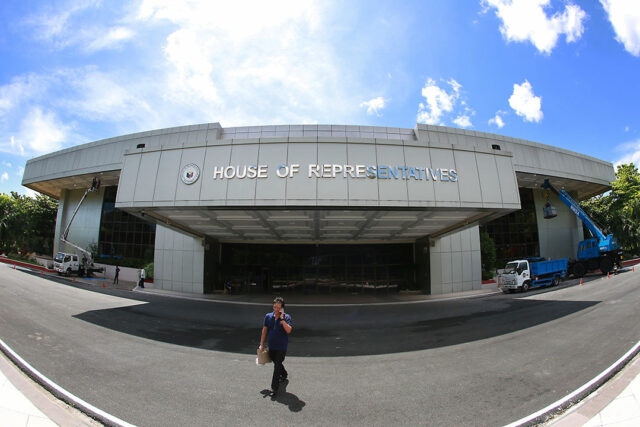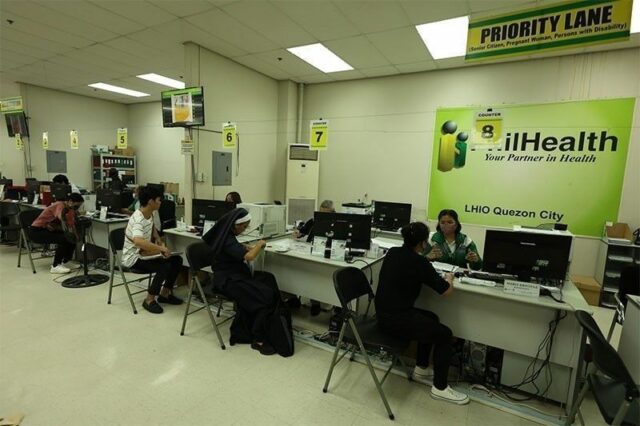PHILIPPINE President Ferdinand R. Marcos, Jr. on Monday defended his government’s flood infrastructure after the country was battered by two storms that hit almost 9 million Filipinos and caused major flooding in many cities.
“We have flood control systems, but these were just really overwhelmed,” he told reporters in mixed English and Filipino on the sidelines of his visit to Laurel town in Batangas province south of the capital Manila, vowing to build a system that can withstand climate change’s worse effects.
“They didn’t withstand it (Severe Tropical Storm Trami) because it was the first in Philippine history. We only experienced it now,” he added.
Trami, locally named Kristine and which Greenpeace Philippines dubbed as the “third-[most] highly devastating weather event to batter the country this year,” killed at least 59 people in Batangas province, 20 of whom were buried in a landslide in the municipality of Talisay, which Mr. Marcos also visited.
The National Disaster Risk Reduction and Management Council said in a morning report on Sunday the death toll from Trami, which made landfall in the Philippines on Oct. 24, and Super Typhoon Kong-rey had reached 146.
It said 8.63 million people from 2.2 million families had been affected. More than 200,000 people from 56,396 families were staying in 467 evacuation centers, it added.
Mr. Marcos admitted that his government’s response to the storms was “never enough.” “I’ll tell you the truth, it’s never enough, it’s never enough. I wish we could do more.”
“We are doing everything that we can, but you know when you lose a life, you lose a life, what can you do about that? It’s a terrible tragedy,” he added.
The President noted that the country did not expect it would be hit by a storm as powerful as Trami, which he said dumped more rains than Ketsana (Ondoy), which submerged parts of Metro Manila and killed more than 200 people in 2009 as it dumped more than 400 millimeters of rain.
In contrast, Kristine dumped about 700 millimeters of rain — almost double that of Ketsana — he said, as he defended the country’s flood infrastructure from criticisms.
“Our flood-control projects were designed to withstand flood waters caused by storms like Ondoy,” he said in Filipino. “Those landslides were new, they didn’t happen in their entire lives, in the history of areas that faced landslides due to high levels of water.”
Mr. Marcos reiterated that the record-breaking flood levels experienced by the Philippines were highly attributable to climate change. “We are now seeing the climate change that we have been talking about.”
In response to the President’s remarks, Greenpeace Philippines campaigner Khevin A. Yu told BusinessWorld: “Extreme weather events are nothing new for the Philippines as we have been the most affected country by climate change for decades.”
“Damage is inevitable due to the worsening nature of the climate crisis. As the new chairman of the Loss and Damage Fund (LDF), President Marcos should start demanding payment for our loss and damage during Super Typhoon Kristine from the culprits of the climate crisis,” he added.
Before Trami, the Philippines in July was hit by Typhoon Gaemi, killing dozens and submerging parts of the capital region and nearby provinces in floodwaters.
‘FIRST TIME’
The country has been facing stronger typhoons through the years. On Nov. 8, it will commemorate the devastation of Super Typhoon Haiyan (Yolanda), which killed more than 6,000 Filipinos mostly in the central Philippine province of Leyte in November 2013.
Mr. Marcos said critics of the government’s flood-control infrastructure should also look at what is happening in other countries such as Spain, where more than 200 people died in a major flood in the Valencia region.
“Look, it’s not only here. Have you seen what happened to Spain? Have you seen what’s happening in various countries, in the States?” he asked, noting that these events are happening for the first time.
A Reuters report showed survivors of the deadly flooding in Valencia, Spain protesting during a visit by Spanish King Felipe, Queen Letizia and Prime Minister Pedro Sanchez, “with some throwing mud at them.”
Mr. Marcos cited the need to change the design of public infrastructure including flood-control projects, slope protection facilities and bridges. “Let’s look for a better design.”
The Philippines has been chosen to head the board of the LDF, a United Nations financing mechanism that will benefit countries vulnerable to climate change, including the host-country itself.
The election followed efforts by the Marcos government to promote the Philippines as a country that is committed to the global green transition, despite the slow phase-out of dirty sources of energy and policies that green groups say are anti-environment.
Mr. Marcos has branded himself as a climate leader, citing the need for sustainable practices, and even touting the presence of wind mills in his home province of Ilocos Norte in northern Philippines.
Asked whether the government would impose a moratorium on development projects amid the worsening effects of typhoons, Mr. Marcos said: “That’s always been the problem, but it has not been as severe as it is now. And again, it’s climate change.”
“It’s something that has never happened before and it is something that we have to deal with. There’s no other way,” he said. “We have to be smarter. We have to be more technologically aware of what is available so that we can reduce the effects.”
During Mr. Marcos’ visit to Batangas, the Department of Human Settlements and Urban Development distributed housing materials worth P6 million donated by the Metrobank Foundation Inc. to victims.
About 150 families from Talisay town and 200 families each from the municipalities of Laurel and Agoncillo received home materials and essentials from the agency and its partners, it said in a statement. Each package was composed of GI roofs, marine plywood, lumber and nails, which will be used to repair damaged houses.
The Office of the President also gave P10,000 each to 4,378 beneficiaries in the municipalities of Agoncillo, Laurel and Talisay.
The Philippines remained the most disaster-prone country for the 16th straight year in the World Risk Index, which assesses the disaster risk for 193 countries using 100 indicators.
The Philippines lies along the typhoon belt in the Pacific and experiences about 20 storms each year. It also lies in the so-called Pacific Ring of Fire, a belt of volcanoes around the Pacific Ocean where most of the world’s earthquakes strike. — Kyle Aristophere T. Atienza



